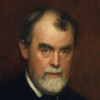“ When we reason from analogies, the man, who has the greater experience or the greater promptitude of suggesting analogies, will be the better reasoner. ”
David Hume, An Enquiry Concerning Human Understanding (1748). copy citation
| Author | David Hume |
|---|---|
| Source | An Enquiry Concerning Human Understanding |
| Topic | experience reason |
| Date | 1748 |
| Language | English |
| Reference | |
| Note | |
| Weblink | http://www.gutenberg.org/files/9662/9662-h/9662-h.htm |
Context
“The forming of general maxims from particular observation is a very nice operation; and nothing is more usual, from haste or a narrowness of mind, which sees not on all sides, than to commit mistakes in this particular.
7. When we reason from analogies, the man, who has the greater experience or the greater promptitude of suggesting analogies, will be the better reasoner.
8. Byasses from prejudice, education, passion, party, &c. hang more upon one mind than another.
9. After we have acquired a confidence in human testimony, books and conversation enlarge much more the sphere of one man's experience and thought than those of another.”
source


